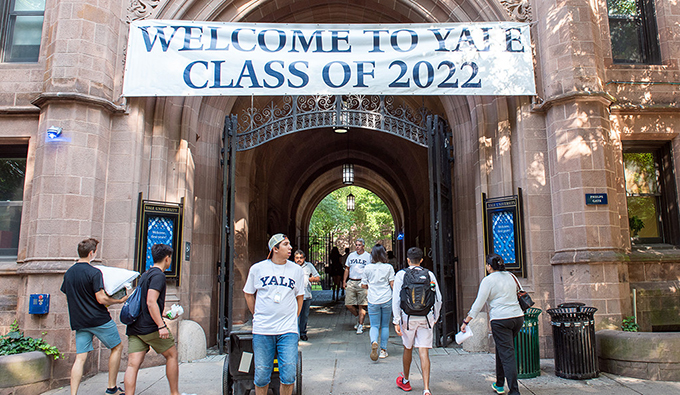
Ah, “The Ivy League.” The phrase justifiably conjures up romanticized notions of the best and brightest, the future shapers of the world. Now, I’ve had a few friends go there, and even have a few colleagues working there, so my own notions are stained with dark smears of “reality,” but the fact remains: throughout the history of this country, our political leaders are quite commonly chosen from Ivy League graduates, so it’s reasonable to believe that, yes, the people going there today will be political factors in the decades to come.
A recent survey of incoming Yale freshmen gives a nice snapshot of our political leadership in the future. Yes, there are other Ivy League schools, but I assure the gentle reader they all draw from the same pool of top candidates, and all have very similar guidelines for who they accept…take Yale as a template for what our leadership will look like in a few decades, and weep.
In terms of racial demographics, 46% of new students are Caucasians, with 18% being Asians. It’s so weird that anyone who stands up and says “America won’t be a white country soon” is denounced as a Nazi RACIST, but it’s clear the Ivy League understands simple mathematical reality, and is hedging their bets. Perhaps this isn’t weep-worthy, but our top schools didn’t become top schools, and stay such for centuries, by making bad decisions or failing to understand how the world works.
Yale’s class of 2022 is one of the most diverse in University history, with a record 47 percent of the class made up by U.S. citizens or permanent residents who identify themselves as members of a minority ethnic or racial group, according to public University figures.
Wait…more than half of Yale’s incoming class aren’t citizens or permanent residents. The top schools of this country feel that it’s no longer worth their while to spend most of their time educating the citizens of this country. Still not worth a weep? Perhaps I’m just misreading that. Let’s continue…
Female respondents outnumbered male respondents by nearly 9 percentage points.
The above is hardly restricted to the Ivy League, as many schools have a strong majority of females to males in their student body. The difference of course is it’s clear Yale believes that future political power in this country will be held by females, particularly non-white females who aren’t citizens. Perhaps I’m just worrying too much here?
Around three-fourths of those surveyed identified as straight, while nearly 5 percent identify as gay and just over 9 percent as bisexual or transsexual. Three percent opted not to answer, and the remaining 8 percent identified as asexual, ace spectrum or questioning their sexual orientation.
Now this is disturbing. In the “normal” population, some 95% of the people are hetero; transsexuals (more commonly called transgender today, and very different than bisexual, incidentally) generally run less than 1% of the population.
But at Yale, typical heterosexuals are grossly under-represented, while the trans/bi population is over represented by a factor of 25. Where’s the outrage? Where’s the call to end this? Where are the scholarships just for heterosexuals? I could go on, but our future leaders, very likely to be over-representing tiny sexual minorities, are, even if heterosexual, going to leave Yale with a distorted view of just how common the various sexual “protected classes” are.
An overwhelming number of survey respondents said they felt extremely positive about their high school experience: Slightly over 80 percent rated their last four years as “good” or “very good.”
This is interesting; I loathed my high school experience, mostly because attacks by bullies were an every-other-day affair. Even without the constant fear and harassment, I doubt I would have liked high school much.
Our future leaders, however, think our school system is wonderful. Even though all data says our schools are failing in ever more unprecedented ways, you can’t look at the above and suspect for one moment our leaders will have even a tiny inclination to change things. The system worked great for them, after all. And so expect the next generation to be damned to the same public school system that harmed most of this generation.
Still not weeping? More, then:
Nearly three-fourths of respondents identify as “very liberal” or “somewhat liberal.” While just over 16 percent said they were centrist, and almost 9 percent somewhat “conservative,” slightly less than 2 percent of respondents identified as “very conservative.”
One of the most disturbing quirks of our supposed “two party” system is we have many “RINO”s, Republicans-In-Name-Only, who are actually Democrats despite what it says on the ballot. The takeaway? We don’t have enough conservatives in our country to “man” the Republican party. Our Ivy League schools have around 5 times as many transgender people as “very conservative” people.
How might that affect the future of politics in this country?
Why do these schools rant about how great they are at diversity, and then go out of their way to have conservative representation far, far, below what it is in reality? Why am I so alone in asking these types of questions?
I’m still recovering, so a short essay for today but…it’s a puzzle why this publicly available data can’t be used to make very reasonable projections about the future of this country.
